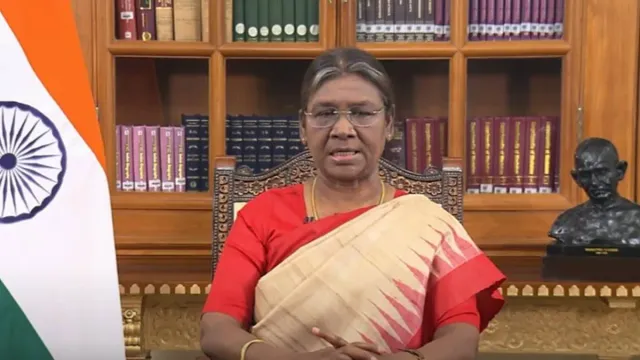- By Nidhi Giri
- Thu, 15 May 2025 12:04 PM (IST)
- Source:JND
President Droupadi Murmu wrote to the Supreme Court questioning whether the Governors and President need to follow timelines to decide on state bills referred for consent. This comes after the apex court’s verdict in the Tamil Nadu government versus Governor case, which effectively set a deadline for the President and Governors to clear Bills passed by the legislature.
The President's response highlights that Article 200 of the Constitution of India delineates the powers of the Governor and the procedures for granting or withholding assent to Bills, as well as reserving a Bill for the President's consideration. However, Article 200 does not specify any timeline for the Governor to exercise these constitutional options.
Similarly, Article 201 outlines the President's authority and process for assenting to or withholding assent from Bills, but it does not impose any deadlines or procedures for the exercise of these constitutional powers.
Furthermore, the Constitution of India recognises numerous instances where the President's assent is required before legislation can take effect in a state. The discretionary powers of the Governor and the President, as provided under Articles 200 and 201, are shaped by multiple considerations, including federalism, legal uniformity, national integrity and security, and the doctrine of separation of powers.
“Is the exercise of constitutional discretion by the President under Article 201 of the Constitution of India justiciable? In the absence of a constitutionally prescribed timeline and the manner of exercise of powers by the President, can timelines be imposed and the manner of exercise be prescribed through judicial orders for the exercise of discretion by the President under Article 201 of the Constitution of India?” President Murmu asked.
“Is the exercise of constitutional discretion by the Governor under Article 200 of the Constitution of India justiciable? Is Article 361 of the Constitution of India an absolute bar to judicial review in relation to the actions of a Governor under Article 200 of the Constitution of India? In the absence of a constitutionally prescribed time limit, and the manner of exercise of powers by the Governor, can timelines be imposed and the manner of exercise be prescribed through judicial orders for the exercise of all powers under Article 200 of the Constitution of India by the Governor?” President Murmu questioned.
(With Agency Inputs)

